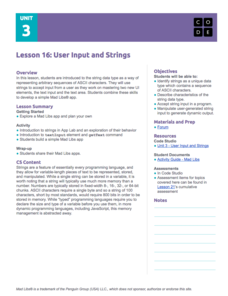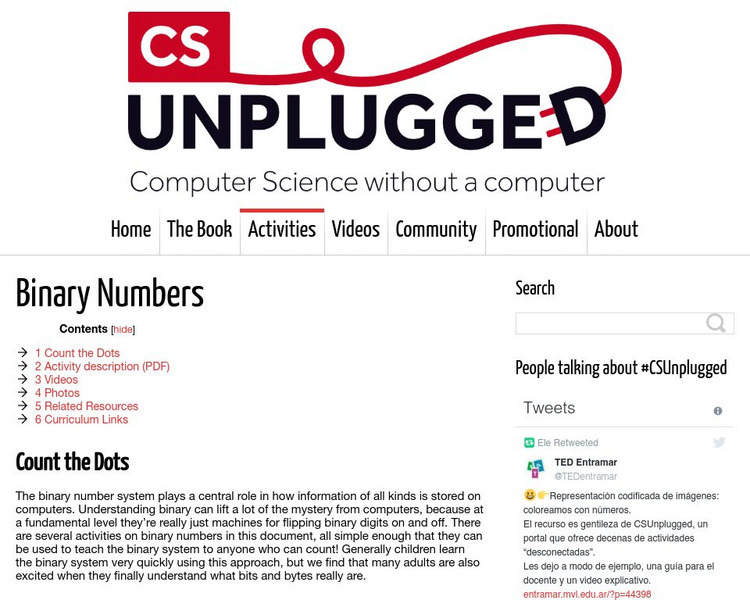Code.org
Bytes and File Sizes
A bite of bits. The first lesson in a unit of 15 introduces the class to the byte. Pupils learn about other standard units for measuring file sizes, develop an understanding of relative sizes and the kind of units used to measure...
Curated OER
Birth of Bits and Bytes
Students research the development of modern computer technology and ENIAC, the first computer. They discuss the origins of the modern computer and the use of flow charts. They create a flow chart on poster board using Crayola Markers....
Curated OER
Binary Coding
Students identify different uses and forms of coding information, such as memory chips, discuss and create list of everyday items in which memory devices are used, watch video, play Bits and Bytes Game, and use binary code to encode and...
Curated OER
Gumshoeing the Web
Students discuss hackers and issues of computer privacy. They read the article "Sniffing Out Crime by Bits and Bytes," and debate the article through role-playing.
Code.org
Encoding B and W Images
Imagine drawing with zeros and ones. The third lesson in a unit of 15 introduces the class to creating black and white images. Pairs get together to create an encoding scheme in order to make these images. They move on to a...
Curated OER
Understanding Computer Images
Ninth graders explain differences between bitmapped images and vector images. They calculate pixels and transpose the raw file size to bits, bytes, and kilobytes. They compare formats for displaying images on a Web page.
Code.org
Encoding Color Images
Color me green. The fourth lesson in a unit of 15 introduces the class to color images and how to encode color images using binary code and hexadecimal numbers — and they will quickly notice that it is easier to code the...
Code.org
User Input and Strings
Pupils learn to apply strings in computer science. They master two new user interface elements and also use string type data to represent ASCII characters. Finally, individuals create an app for Mad Libs in the eighth lesson of the series.
Cornell University
Magnetic Mad Libs
Examine the science behind computer communication. After defining the properties of magnets, learners simulate how a computer hard drive works by sending each other binary codes using the magnets. They use these communications to...
Curated OER
In the Ballpark
Students practice estimation skills with the video series "Interactions: Real Math, Real Careers". They complete a hands-on activity for estimating large numbers.
Curated OER
Homonyms - Quiz 24
Students practice spelling homonyms. In this homonym instructional activity, students read the sentences and select the correct spelling to complete the homonym quiz.
Crayola
Crayola: Birth of Bits and Bytes (Lesson Plan)
This lesson plan incorporates many subjects! Students create a flow chart after studying the "Evolution," of computers. Also provides adaptations and references to use. (To access this lesson plan, you must register with Crayola.com....
University of Canterbury
University of Canterbury: Cs Unplugged: Binary Numbers
With this lesson, educators can teach the binary system to anyone who can count. Using this approach, many adults are also excited when they finally understand what bits and bytes really are.












